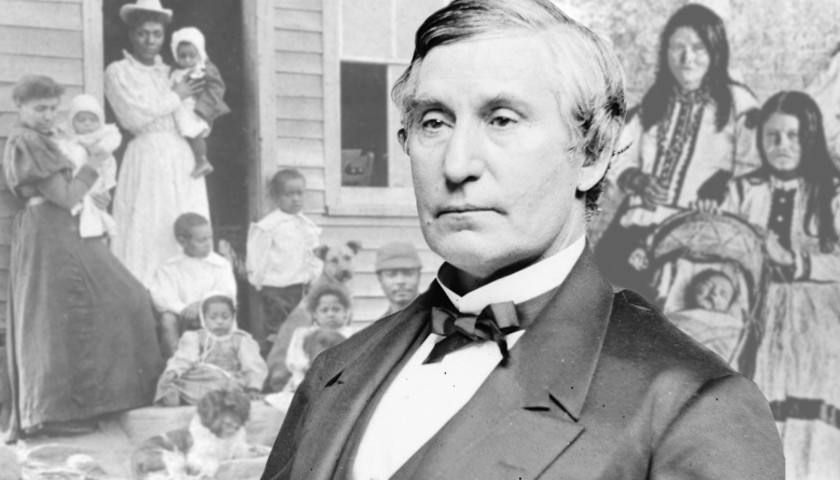by James D. Agresti Michael Anton, a former national security official in the Trump administration, recently argued in a Washington Post op-ed that the current federal practice of granting citizenship to the children of illegal immigrants “is an absurdity—historically, constitutionally, philosophically and practically.” A number of media outlets have published fiery rebuttals declaring that Anton is dead wrong. They claim that the 14th Amendment to the U.S. Constitution gives citizenship to all children born in the U.S., except for the children of diplomats. However, the legislative history of the 14th Amendment proves that it does not award citizenship to the children of illegal immigrants or anyone who is not legally and permanently residing in the United States. Background In 1866, shortly after the Civil War ended and slavery was abolished, a bloc of Congressmen called the “Radical Republicans“ passed a civil rights law to ensure that African Americans had the “full and equal benefit of all laws and proceedings for the security of person and property, as is enjoyed by white citizens….” This law applied to former slaves but not to foreigners, and thus, it stated that: all persons born in the United States and not subject to any foreign power, excluding Indians not taxed, are hereby declared to…
Read the full storyTag: 14th Amendment
Despite the Media-Driven Rhetoric, the Constitution’s 14th Amendment Does Not Grant ‘Birthright Citizenship’
by James D. Agresti Michael Anton, a former national security official in the Trump administration, recently argued in a Washington Post op-ed that the current federal practice of granting citizenship to the children of illegal immigrants “is an absurdity—historically, constitutionally, philosophically and practically.” A number of media outlets have published fiery rebuttals declaring that Anton is dead wrong. They claim that the 14th Amendment to the U.S. Constitution gives citizenship to all children born in the U.S., except for the children of diplomats. However, the legislative history of the 14th Amendment proves that it does not award citizenship to the children of illegal immigrants or anyone who is not legally and permanently residing in the United States. Background In 1866, shortly after the Civil War ended and slavery was abolished, a bloc of Congressmen called the “Radical Republicans“ passed a civil rights law to ensure that African Americans had the “full and equal benefit of all laws and proceedings for the security of person and property, as is enjoyed by white citizens….” This law applied to former slaves but not to foreigners, and thus, it stated that: all persons born in the United States and not subject to any foreign power, excluding Indians not taxed, are hereby declared to…
Read the full storyDual Citizenship Rule Ousts Australia’s Deputy Prime Minister
The Australian government was thrown into turmoil Friday after losing its one-seat majority with the nation’s deputy prime minister kicked out of parliament over his dual citizenship. Barnaby Joyce was among seven politicians embroiled in a crisis after falling afoul of a previously obscure constitutional rule that bars dual citizens from sitting in parliament. The High…
Read the full storyConstitution Series: The Fourteenth Amendment – Original Intent and Unintended Consequences
This is the nineteenth of twenty-five weekly articles in The Tennessee Star’s Constitution Series. Students in grades 8 through 12 can sign up here to participate in The Tennessee Star’s Constitution Bee, which will be held on September 23 from 9 a.m. to noon at Sycamore High School, 1021 Old Clarksville Pike, Pleasant View, Tennessee. by John Harris The Fourteenth Amendment was one of three amendments made to the United States Constitution in the five years following the end of the Civil War. These amendments were the Thirteenth, Fourteenth, and Fifteenth amendments. These three amendments were all adopted as part of the Northern efforts to address circumstances in or related to the Southern states following the war. The Thirteenth Amendment, which was ratified in 1865, abolished slavery. The Fourteenth Amendment addressed several issues concerning the former slaves including the issue of citizenship. The Fifteenth Amendment prohibited discrimination in voting rights of citizens on the basis of a person’s race, color, or previous condition of servitude. The Fourteenth Amendment was proposed and then passed just as the Civil War was ending. It was proposed at the same time that the federal Civil Rights Act of 1866 was enacted. Congress proposed it to the States as an…
Read the full storyCommentary: Justice for All: Payroll Deductions
It is our belief that the state and most school districts in the state are violating the Equal Protection Clause of the Fourteenth Amendment to the U.S. Constitution by denying non-union teachers a benefit extended to the “similarly situated” union teacher.
Read the full story



